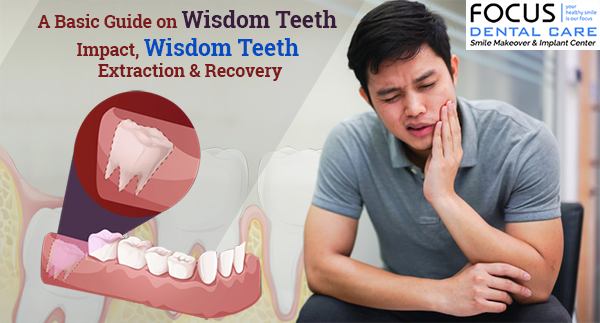It is difficult to say if we can attain wisdom as we age and mature but certainly, we get our wisdom teeth. Just like our life, our mouth goes through various developmental changes as we become an adult. The development of third molars between the ages 17 and 21 is the final straw in this evolutionary process: two on the top and two on the top to complete the whole pack of 32. And these third molars are nicknamed as wisdom teeth as their development coincides with our mature age.
Molars are the toughest teeth in our mouth which help us grind the food so having a third molar is beneficial right?
Yes, the development of wisdom teeth is a benefit if and only is they develop properly in the mouth just like the other teeth, but that is not the case more often than not.
Potential Problems with Wisdom Teeth
Since most of the teeth are already fully emerged and are in place, wisdom teeth may not have enough room to grow and develop optimally. These space issues may vary their position and angle making them vulnerable to the impact of neighbouring molars. In a few cases, they are trapped in the jaws or gums causing pain and other dental problems. Following are some of the problems caused by the impacted wisdom teeth:
- As the impacted wisdom teeth can vary their position and angle, they may cause problems to the surrounding teeth increasing the risk of infection and other orthodontic problems.
- Owing to their position it is not easy to clean them efficiently increasing the risk of tooth decay.
- Partially erupted wisdom teeth covered by gum tissue carry a higher risk of gum diseases.
- As the wisdom tooth develops in the sac of the jawbone, any complication such as the formation of cyst in the sac can result in removal of bone and tissue.
Swollen gums, jaw pain, bad breath, difficulty in mouth opening, bleeding gums are some of the symptoms of problems caused by wisdom teeth.
Wisdom Tooth Extraction:
The most common treatment to treat the problems caused by wisdom teeth is the wisdom tooth extraction performed by an oral dental surgeon or dental implant specialist. Both upper wisdom tooth extraction and lower wisdom tooth extraction are performed based on the severity of the symptoms.
Procedure for Wisdom Tooth Extraction:
The procedure for wisdom tooth removal depends on how much the tooth has erupted from the jawline. Following are the two procedures followed by the dental specialist:
Simple extraction: Simple extraction is performed in case the wisdom tooth has completely erupted. The gums are numbed down, the tooth is loosened, pulled out, the area is cleaned and bleeding is stooped.
Surgical extraction: Surgical extraction is performed when the tooth is still below the gum line. The patient’s given anaesthesia, the surgeon cuts open the gum, removes the problematic bone, takes out the tooth and stitches out the cut. The patient will be under anaesthesia and as the surgery is the simple outpatient procedure, the patient can leave home on the same day.
Wisdom Tooth Extraction Recovery:
Wisdom tooth extraction surgery can cause light swelling, bruising which go away in 3 to 4 days. The dental surgeon removes the stitches after about 7 days from the procedure. Jaw stiffness and soreness goes away in 7 to 10 days. Exact recovery time for wisdom tooth extraction varies based on the patient’s condition. On average it takes not more than 2 weeks to lead a pain-free life.
So if your wisdom tooth is causing problems you can easily get them removed with wisdom teeth extraction. If you are living in and around Hyderabad and looking to get relieved from wisdom teeth problems our Focus Dental Care Clinic in Jubliee Hills and Focus Dental Care Clinic in Gachibowli are offering wisdom teeth treatment procedures at affordable prices, you can contact us here.


